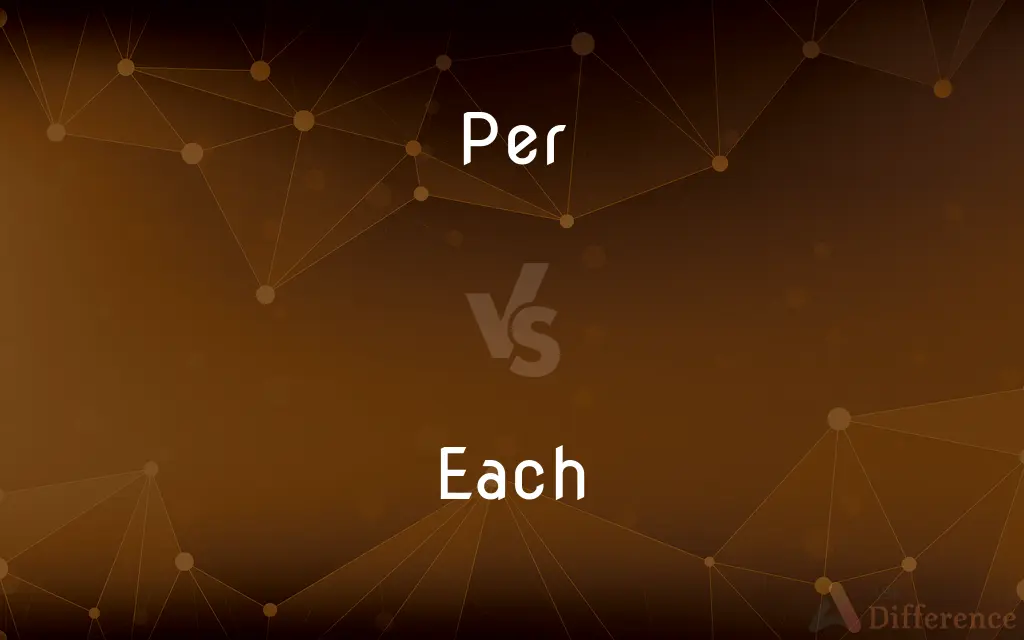Per vs. Each — What's the Difference?
Edited by Tayyaba Rehman — By Fiza Rafique — Updated on March 19, 2024
"Per" is a preposition used to express a rate or ratio, indicating the relationship between two quantities, whereas "each" is used to specify individual members of a group or items in a series, emphasizing their individuality or separateness.

Difference Between Per and Each
Table of Contents
ADVERTISEMENT
Key Differences
The term "per" is commonly used to denote a rate or ratio, suggesting a proportional relationship between quantities, such as in "miles per hour" or "cost per item," where it communicates a division or allocation across a certain measure. "Each," on the other hand, is used to focus on individual elements within a group or series, often to highlight the distinct consideration or treatment of those elements, as in "each student received a certificate" or "each item was carefully inspected."
When using "per," the emphasis is on the relationship or ratio that applies uniformly across a set or within a context, such as in financial transactions, statistical analyses, or distribution scenarios. In contrast, "each" is employed to underscore the individuality of items or persons, often in contexts where the unique handling, characteristics, or responses of those items or persons are relevant.
"Per" is often used in more formal or technical contexts, especially where precision in describing relationships between quantities is crucial, such as in scientific, economic, or legal documentation. "Each," however, is more versatile, appearing in both formal and informal contexts to denote individual attention or allocation, making it suitable for a wide range of situations from casual conversations to detailed instructions or reports.
In expressions involving "per," there's usually an implied understanding that the ratio or rate is consistent or standardized, such as "calories per serving" where "per" indicates a consistent measure applied across servings. With "each," the focus shifts to the notion that every single unit or individual in a series or group is considered separately, possibly with an implication that there's a uniform action or characteristic applied to all, but with attention to their separateness, as in "each member has a vote."
While "per" is instrumental in contexts where the distribution, ratio, or rate is the focus, providing a sense of collective measurement or allocation, "each" plays a crucial role in contexts where the emphasis is on individual elements, ensuring that the separateness and distinct consideration or treatment of each item or person is clearly communicated.
ADVERTISEMENT
Comparison Chart
Usage
Expresses a rate or ratio
Specifies individual members or items
Context
Distribution, measurement, relationships
Individuality, separateness
Emphasis
Relationship between quantities
Individual attention or consideration
Common Contexts
Scientific, economic, legal
Casual, detailed instructions, reports
Implication
Consistent measure or allocation
Separate consideration or action
Compare with Definitions
Per
Describes relationships in distribution or statistics.
There are 4 accidents per 100,000 hours of operation.
Each
Can be used in both formal and informal contexts.
Each member of the team contributes unique skills.
Per
Used to indicate a ratio or rate between two quantities.
The car travels 60 miles per hour.
Each
Refers to individual elements within a group.
Each student in the class presented their project.
Per
Implies a standardized measure or allocation.
The printer uses 10 cents' worth of ink per page.
Each
Emphasizes separateness and individual attention.
Each apple was polished before being put on display.
Per
Used in contexts of efficiency or productivity.
The factory's output is 500 widgets per day.
Each
Focuses on the distinct handling or characteristics of items.
Each response was carefully evaluated by the committee.
Per
Often found in formal or technical descriptions.
The contract stipulates a delivery of 100 units per month.
Each
Indicates uniform action or characteristic applied separately.
Each ticket costs $10.
Per
For each (used with units to express a rate)
He charges £2 per square yard
Each
Being one of two or more considered individually; every
Each person cast a vote. My technique improved with each lesson.
Per
By means of
Send it per express
Each
For or to each one; apiece
Ten cents each.
Per
Divided by a line in the direction of
Per saltire
Each
All; every; qualifying a singular noun, indicating all examples of the thing so named seen as individual or separate items (compare every).
Make sure you wash each bowl well.
The sun comes up each morning and sets each night.
Per
To, for, or by each; for every
Gasoline once cost 40 cents per gallon.
Each
For one; apiece; per.
The apples cost 50 cents each.
Per
According to; by
Changes were made to the manuscript per the author's instructions.
Each
Every one/thing individually or one by one.
I'm going to give each of you a chance to win.
From each according to his ability, to each according to his needs.
Per
By means of; through.
Each
An individual item: the least quantitative unit in a grouping.
Per
For each one; apiece
Sold the cookies for one dollar per.
Each
Every one of the two or more individuals composing a number of objects, considered separately from the rest. It is used either with or without a following noun; as, each of you or each one of you.
It is a bad thing that men should hate each other; but it is far worse that they should contract the habit of cutting one another's throats without hatred.
Let eachHis adamantine coat gird well.
In each cheek appears a pretty dimple.
Then draw we nearer day by day,Each to his brethren, all to God.
The oak and the elm have each a distinct character.
Per
Per hour
Was driving at 60 miles per.
Each
Every; - sometimes used interchangeably with every.
I know each lane and every alley green.
In short each man's happiness depends upon himself.
Per
For each.
Admission is £10 per person.
Miles per gallon
Beats per minute
$2.50 per dozen
Each
(used of count nouns) every one considered individually;
Each person is mortal
Each party is welcome
Per
To each, in each (used in expressing ratios of units).
12 inches per foot
100 centimeters per meter
Each
To or from every one of two or more (considered individually);
They received $10 each
Per
(medicine) By the, by means of the, via the, through the.
Introduce the endoscope per nasum.
The medication is to be administered per os.
Per
In accordance with, as per
I parked my car at the curb per your request.
Implement a program that computes the approximate grade level needed to comprehend some text, per the below.
Note that while the walkthrough illustrates that words may be separated by more than one space, you may assume, per the specifications above, that no sentences will contain more than one space in a row.
Per
They singular. Gender-neutral neologistic third-person singular subject pronoun, coordinate with gendered pronouns she.}}
Per
Them singular Neologistic gender-neutral third-person singular object pronoun, suggested for use in place of her.}}
Per
Belonging to per, their singular. Gender-neutral third-person singular possessive adjective, coordinate with gendered her.}}
Per
Through; by means of; through the agency of; by; for; for each; as, per annum; per capita, by heads, or according to individuals; per curiam, by the court; per se, by itself, of itself. Per is also sometimes used with English words.
Common Curiosities
Can "per" and "each" be used interchangeably?
While both can relate to individual items, they are not interchangeable as "per" focuses on rates or ratios, and "each" on individual members or items.
Can "each" imply a collective action?
"Each" can imply a collective action but emphasizes that the action is applied individually to every member or item in the group.
Is "per" only used in mathematical or scientific contexts?
"Per" is common in these contexts due to its association with ratios and rates, but it's also used in everyday language and business, such as "per person" in event planning.
Is "each" suitable for formal reports or documents?
Yes, "each" can be used in formal contexts to ensure clarity when individual elements need distinct consideration or mention.
How does the choice between "per" and "each" affect instructions or guidelines?
Choosing "each" can make instructions more personal and clear for individual actions, while "per" can set a standard or rate to be followed.
What role does "per" play in budgeting or financial contexts?
"Per" is crucial in financial contexts for understanding costs and allocations, such as in budgeting expenses per department or per project.
How does the use of "per" affect the interpretation of data?
Using "per" can provide clarity on the relationship between quantities, helping to standardize and compare data, such as in per capita income.
Can "each" be used to emphasize exclusivity?
Yes, "each" can emphasize exclusivity by highlighting that something is available to or required from every single individual or item separately.
Can the use of "each" in education or training emphasize personal attention?
Yes, using "each" in educational contexts can underscore the tailored approach or individual attention given to students or participants.
How do "per" and "each" relate to efficiency?
"Per" is often used to discuss efficiency in terms of output or resource usage (e.g., miles per gallon), while "each" can highlight the individual contributions or costs within that efficiency metric.
Share Your Discovery

Previous Comparison
Solution vs. Application
Next Comparison
Solipsism vs. NihilismAuthor Spotlight
Written by
Fiza RafiqueFiza Rafique is a skilled content writer at AskDifference.com, where she meticulously refines and enhances written pieces. Drawing from her vast editorial expertise, Fiza ensures clarity, accuracy, and precision in every article. Passionate about language, she continually seeks to elevate the quality of content for readers worldwide.
Edited by
Tayyaba RehmanTayyaba Rehman is a distinguished writer, currently serving as a primary contributor to askdifference.com. As a researcher in semantics and etymology, Tayyaba's passion for the complexity of languages and their distinctions has found a perfect home on the platform. Tayyaba delves into the intricacies of language, distinguishing between commonly confused words and phrases, thereby providing clarity for readers worldwide.














































